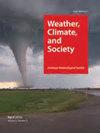对历史天气数据的正式信任
IF 1.9
4区 地球科学
Q3 ENVIRONMENTAL STUDIES
引用次数: 2
摘要
历史气象仪器观测对于了解过去、现在和未来的气候变率和变化至关重要。然而,全球需要抢救的历史天气观测资料的数量远远超过了可供抢救的资源。哪些观察结果应该优先考虑?在这里,我们形式化的指导方针,以帮助决定抢救历史数据。与其等到资源密集型数字化完成后再评估数据的价值,不如从观察的背景和观察者的历史中收集见解。可以从使用的转录平台和参与数据救援过程的转录器中获得进一步的见解,如果没有这些,即使是最好的历史观察也可能被错误地处理。我们使用信任的概念来帮助集成和形式化整个数据救援生命周期的指导方针,从原始观察源到转录的数据元素。五个基于公民科学的历史数据救援案例,两个来自加拿大,三个来自澳大利亚,指导我们构建信任清单。清单汇集了从原始观察员和他们的观察到目前的转录者和他们使用的转录方法的信息。生成了19个要素,以帮助未来的数据救援项目回答是否应将资源用于救援所考虑的历史气象材料的问题。本文章由计算机程序翻译,如有差异,请以英文原文为准。
Formalizing Trust in Historical Weather Data
Historical instrumental weather observations are vital to understanding past, present, and future climate variability and change. However, the quantity of historical weather observations to be rescued globally far exceeds the resources available to do the rescuing. Which observations should be prioritized?
Here we formalize guidelines help make decision on rescuing historical data. Rather than wait until resource-intensive digitization is done to assess the data’s value, insights can be gleaned from the context in which the observations were made and the history of the observers. Further insights can be gained from the transcription platforms used and the transcribers involved in the data rescue process, without which even the best historical observations can be mishandled. We use the concept of trust to help integrate and formalize the guidelines across the lifecycle of data rescue, from the original observation source to the transcribed data element. Five cases of citizen science-based historical data rescue, two from Canada and three from Australia, guide us in constructing a trust checklist. The checklist assembles information from the original observers and their observations to the current transcribers and transcription approaches they use. Nineteen elements are generated to help future data rescue projects answer the question of whether resources should be devoted to rescuing historical meteorological material under consideration.
求助全文
通过发布文献求助,成功后即可免费获取论文全文。
去求助
来源期刊

Weather Climate and Society
METEOROLOGY & ATMOSPHERIC SCIENCES-
CiteScore
3.40
自引率
13.60%
发文量
95
审稿时长
>12 weeks
期刊介绍:
Weather, Climate, and Society (WCAS) publishes research that encompasses economics, policy analysis, political science, history, and institutional, social, and behavioral scholarship relating to weather and climate, including climate change. Contributions must include original social science research, evidence-based analysis, and relevance to the interactions of weather and climate with society.
 求助内容:
求助内容: 应助结果提醒方式:
应助结果提醒方式:


